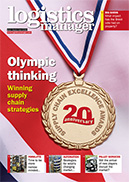It’s hard not to be impressed by the success of Team GB at the Rio Olympics, winning 67 medals in total – the best result in more than a century, putting the UK second only to the United States in the medals table.
It’s a massive turnaround since the low point of 1996, when the British team won a total of just 15 medals – only one of which was gold.

So it is not surprising that there is now speculation about how far this success can be a blueprint for other areas of activity – in supply chain and logistics for example.
The first and most obvious change in the UK’s Olympics strategy has been in the funding – lottery funding enabled UK Sport to push £275 million out to the athletes for the Rio games.
How it prioritises sports is bordering on the Darwinian. Successful sports get more money: those that fail see their funding cut – sometimes completely. “Success is measured by the medals won, the number of medallists developed, and the quality of the systems and processes in place to find and support the nation’s most promising future champions,” it says.
While cycling got some £30m in funding for Rio, basketball had its funding cut to the point where it could not field a team. That might be a familiar experience for some in supply chain. There are still too many companies that regard supply chain as the basketball of the corporate world.
Of course, that was once true of cycling – a discipline that has gone from zero to hero in the UK in only a few years. And that highlights the other element of Team GB’s strategy for success: making the best use of the resources available to create a culture of success.

That starts with understanding what success looks like, building the right culture, and motivating people to succeed. This involves clarity of vision, and an intense focus on continuous improvement in which no detail is too small – the now legendary “aggregation of marginal gains”. The idea is that by achieving a one per cent improvement in everything you do, you can achieve a remarkable overall improvement. There are (possibly apocryphal) stories of finding the best pillow for sleep and taking them to hotels.
The strategy has certainly caught the attention of other Olympic teams: there have even been reports of other teams videoing GB athletes as they prepared for events and warmed down afterwards to discover the secrets of success.
There is no doubt that the Team GB approach has enabled a small group of highly driven athletes to achieve world beating performances on the biggest stage of all. But could it turn supply chain into a real driver of competitive advantage? Certainly, there are lessons that can be learnt.
In fact, there is plenty of evidence that supply chain professionals are doing this already – on page 14 we publish the shortlist for the Supply Chain Excellence Awards organised by our sister magazine Logistics & Supply Chain. The standard of the entries is higher than ever, reflecting the drive and innovation of supply chain and logistics professionals. Congratulations to all the shortlisted companies.






